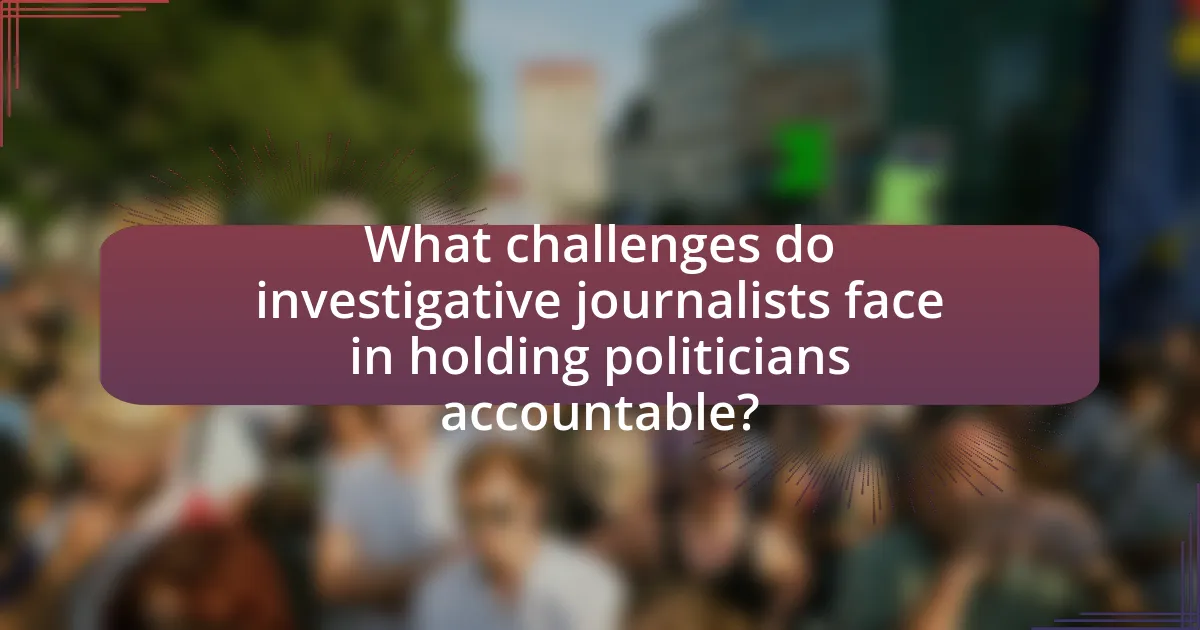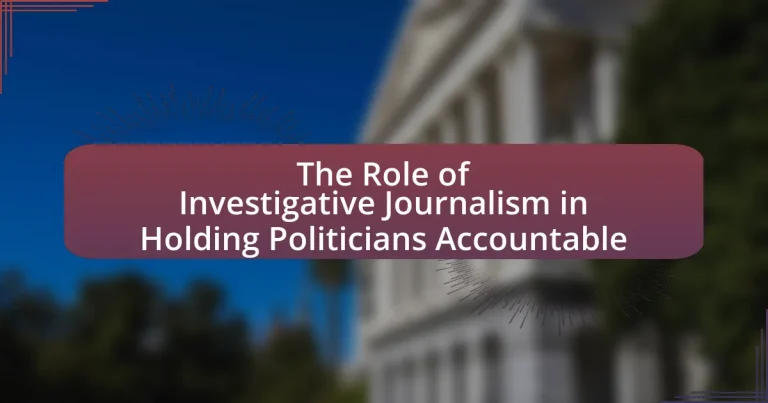Investigative journalism is a vital mechanism for holding politicians accountable by exposing corruption, misconduct, and abuse of power. Through rigorous research and fact-checking, this form of journalism informs the public and fosters a more engaged electorate, as demonstrated by historical examples like the Watergate scandal. The article explores the methods used by investigative journalists, the challenges they face, and the impact of technology on their work. It also discusses how citizens can support investigative journalism to promote transparency and accountability in government.

What is the Role of Investigative Journalism in Holding Politicians Accountable?
Investigative journalism plays a crucial role in holding politicians accountable by uncovering corruption, misconduct, and abuse of power. This form of journalism employs rigorous research, fact-checking, and analysis to expose truths that may otherwise remain hidden from the public. For instance, the Watergate scandal, investigated by journalists Bob Woodward and Carl Bernstein, led to the resignation of President Richard Nixon, demonstrating how investigative reporting can directly impact political accountability. Furthermore, studies show that investigative journalism increases public awareness and engagement, fostering a more informed electorate that can demand transparency and ethical behavior from their leaders.
How does investigative journalism contribute to political accountability?
Investigative journalism contributes to political accountability by uncovering corruption, misconduct, and abuse of power among public officials. This form of journalism employs rigorous research, fact-checking, and in-depth reporting to expose wrongdoing, which can lead to public awareness and demand for accountability. For instance, the Watergate scandal, investigated by journalists Bob Woodward and Carl Bernstein, revealed significant political corruption that ultimately resulted in President Nixon’s resignation. Such investigations not only inform the public but also pressure political leaders to adhere to ethical standards and legal obligations, reinforcing democratic governance.
What methods do investigative journalists use to uncover political misconduct?
Investigative journalists use methods such as in-depth research, interviews, data analysis, and public records requests to uncover political misconduct. In-depth research allows journalists to gather background information and context about political figures and events. Interviews with whistleblowers, experts, and affected individuals provide firsthand accounts and insights into potential misconduct. Data analysis, including the examination of financial records and voting patterns, helps identify discrepancies or unethical behavior. Public records requests enable journalists to access government documents, emails, and other materials that may reveal misconduct. These methods have been effectively employed in notable cases, such as the Watergate scandal, where investigative reporting led to significant political consequences.
How does the public benefit from investigative journalism in politics?
Investigative journalism in politics benefits the public by uncovering corruption, abuse of power, and unethical practices among politicians. This form of journalism serves as a watchdog, providing citizens with critical information that promotes transparency and accountability in government. For instance, the Watergate scandal, exposed by investigative journalists, led to significant political reforms and the resignation of President Nixon, demonstrating the power of journalism in influencing political integrity. By revealing truths that may otherwise remain hidden, investigative journalism empowers the public to make informed decisions and engage in democratic processes.
Why is investigative journalism essential in a democratic society?
Investigative journalism is essential in a democratic society because it serves as a watchdog that holds power accountable and informs the public about issues that affect their lives. This form of journalism uncovers corruption, abuse of power, and injustices, thereby promoting transparency and accountability among politicians and institutions. For instance, the Watergate scandal, investigated by journalists Bob Woodward and Carl Bernstein, led to the resignation of President Richard Nixon, demonstrating how investigative reporting can directly influence political accountability and uphold democratic values.
What are the historical examples of investigative journalism impacting political change?
Investigative journalism has historically impacted political change through notable examples such as the Watergate scandal, which led to President Richard Nixon’s resignation in 1974. Journalists Bob Woodward and Carl Bernstein of The Washington Post uncovered a series of illegal activities linked to Nixon’s administration, prompting a congressional investigation and ultimately Nixon’s departure from office. Another significant instance is the exposure of the Iran-Contra affair in the 1980s, where investigative reporting revealed that the Reagan administration had secretly facilitated arms sales to Iran to fund Contra rebels in Nicaragua, leading to widespread political fallout and congressional hearings. Additionally, the reporting by Seymour Hersh on the My Lai Massacre during the Vietnam War in 1969 brought to light atrocities committed by U.S. soldiers, influencing public opinion and policy regarding the war. These examples demonstrate how investigative journalism has played a crucial role in holding political figures accountable and instigating significant political change.
How does investigative journalism promote transparency in government?
Investigative journalism promotes transparency in government by uncovering corruption, misconduct, and inefficiencies within public institutions. This form of journalism employs rigorous research, fact-checking, and interviews to expose hidden truths that may otherwise remain concealed from the public. For instance, the Watergate scandal, investigated by journalists Bob Woodward and Carl Bernstein, led to the resignation of President Richard Nixon and highlighted the importance of accountability in government actions. By revealing such critical information, investigative journalism empowers citizens to demand accountability and fosters a more informed electorate, ultimately leading to greater transparency in governance.

What challenges do investigative journalists face in holding politicians accountable?
Investigative journalists face significant challenges in holding politicians accountable, primarily due to threats to their safety, legal obstacles, and limited access to information. These journalists often encounter intimidation or harassment from political figures and their supporters, which can deter them from pursuing critical stories. Legal challenges, such as defamation lawsuits or restrictive laws, can also hinder their ability to report freely. Furthermore, politicians may control access to information, making it difficult for journalists to obtain necessary documents or testimonies. For instance, a report by the Committee to Protect Journalists highlights that in many countries, journalists face violence and legal repercussions when investigating corruption or misconduct among political leaders.
How do legal and political pressures affect investigative journalism?
Legal and political pressures significantly hinder investigative journalism by creating an environment of fear and self-censorship among journalists. These pressures can manifest through laws that restrict access to information, such as shield laws that limit the protection of sources, or through political intimidation, where journalists face threats or harassment from government officials. For instance, the 2016 report by the Committee to Protect Journalists highlighted that 70% of journalists worldwide reported facing legal threats, which directly impacts their ability to pursue stories that hold politicians accountable. Such pressures can lead to a chilling effect, where journalists may avoid sensitive topics or critical investigations to evade legal repercussions or political backlash.
What are the risks faced by journalists when investigating politicians?
Journalists face significant risks when investigating politicians, including threats to their safety, legal repercussions, and professional retaliation. These risks manifest in various forms, such as physical violence from political supporters or officials, which has been documented in numerous cases worldwide, including the murders of journalists like Daphne Caruana Galizia in Malta and Jamal Khashoggi in Turkey. Legal risks include defamation lawsuits and charges of espionage or treason, which can be used to intimidate journalists and suppress their work, as seen in countries with restrictive press laws. Additionally, journalists may experience professional retaliation, such as job loss or blacklisting, particularly in environments where political connections influence media operations. These factors collectively create a perilous landscape for journalists dedicated to holding politicians accountable.
How do censorship and media ownership influence investigative reporting?
Censorship and media ownership significantly influence investigative reporting by restricting access to information and shaping the narratives that are presented to the public. Censorship can limit journalists’ ability to pursue stories that may expose corruption or wrongdoing, as seen in countries with strict media regulations where dissenting voices are silenced. For instance, the 2021 World Press Freedom Index reported that countries with high levels of censorship, such as North Korea and China, have severely restricted investigative journalism, leading to a lack of accountability for political figures.
Media ownership also plays a critical role; when a few corporations control the majority of news outlets, they can prioritize their interests over public interest reporting. This concentration of ownership can lead to conflicts of interest, where investigative stories that may harm the owners’ business interests are downplayed or ignored. Research by the Pew Research Center indicates that local news outlets, often owned by larger conglomerates, have reduced their investigative reporting due to budget cuts, further diminishing the ability to hold politicians accountable.
What role does technology play in modern investigative journalism?
Technology plays a crucial role in modern investigative journalism by enhancing data collection, analysis, and dissemination. Journalists utilize advanced tools such as data mining software, social media platforms, and digital forensics to uncover hidden information and verify facts. For instance, the use of data visualization tools allows journalists to present complex information in an accessible format, making it easier for the public to understand issues related to political accountability. Additionally, secure communication technologies enable journalists to protect their sources and sensitive information, which is vital in investigations involving powerful entities. The integration of these technologies has significantly increased the efficiency and impact of investigative journalism, as evidenced by high-profile cases where data analysis led to major revelations about political corruption and misconduct.
How has digital media changed the landscape of investigative journalism?
Digital media has transformed investigative journalism by enhancing accessibility, speed, and audience engagement. The rise of online platforms allows journalists to disseminate information rapidly, reaching a global audience instantly, which contrasts with traditional print media’s slower distribution. Additionally, digital tools such as social media enable journalists to gather real-time feedback and engage with their audience, fostering a more interactive relationship. According to a 2021 Pew Research Center study, 86% of Americans get news from digital devices, highlighting the shift in how audiences consume information. This shift has also led to increased collaboration among journalists, as digital platforms facilitate sharing resources and information, thereby strengthening investigative efforts.
What tools do journalists use to enhance their investigative efforts?
Journalists use a variety of tools to enhance their investigative efforts, including data analysis software, public records databases, and digital communication platforms. Data analysis software, such as Excel or specialized tools like Tableau, allows journalists to analyze large datasets for patterns and insights. Public records databases, like PACER or state-specific repositories, provide access to legal documents and government records that can reveal important information. Digital communication platforms, including encrypted messaging apps like Signal, enable secure communication with sources. These tools collectively empower journalists to uncover truths and hold politicians accountable by providing access to critical information and facilitating thorough analysis.

How can citizens support investigative journalism in holding politicians accountable?
Citizens can support investigative journalism in holding politicians accountable by actively engaging with and funding independent media outlets. By subscribing to, donating to, or purchasing content from investigative journalism organizations, citizens provide the financial resources necessary for thorough investigations. For instance, a 2020 study by the Pew Research Center found that local news organizations, which often conduct critical investigative reporting, have seen a decline in funding, leading to fewer resources for accountability journalism. Additionally, citizens can share investigative reports on social media, amplifying their reach and impact, which encourages more rigorous scrutiny of political actions. This engagement not only raises awareness but also pressures politicians to maintain transparency and accountability.
What actions can individuals take to promote investigative journalism?
Individuals can promote investigative journalism by supporting independent media outlets financially, sharing investigative reports on social media, and advocating for press freedom. Financial support can include subscribing to or donating to nonprofit news organizations, which often focus on investigative work. Sharing reports amplifies their reach, increasing public awareness of critical issues. Advocacy for press freedom involves participating in campaigns that protect journalists from censorship and legal threats, as seen in movements like the Committee to Protect Journalists, which highlights the importance of a free press in democracy.
How can community engagement enhance the effectiveness of investigative journalism?
Community engagement enhances the effectiveness of investigative journalism by fostering trust and collaboration between journalists and the public. When communities actively participate in the investigative process, they provide valuable insights, local knowledge, and firsthand accounts that can lead to more thorough and accurate reporting. For instance, a study by the Pew Research Center found that community-driven journalism initiatives often result in stories that resonate more deeply with local audiences, increasing the likelihood of public engagement and action. This collaboration not only enriches the content but also empowers citizens to hold politicians accountable, as they become more informed and involved in the issues affecting their lives.
What are the best practices for supporting independent media outlets?
The best practices for supporting independent media outlets include providing financial support, promoting media literacy, and advocating for press freedom. Financial support can come from donations, grants, or subscriptions, which help sustain operations and investigative efforts. Promoting media literacy empowers audiences to critically evaluate news sources, fostering a more informed public that values independent journalism. Advocating for press freedom involves supporting policies that protect journalists from censorship and harassment, ensuring they can operate without fear. These practices are essential for maintaining a robust independent media landscape, which is crucial for holding politicians accountable and ensuring transparency in governance.
What are the future trends in investigative journalism related to political accountability?
Future trends in investigative journalism related to political accountability include increased use of data journalism, collaboration among news organizations, and the integration of technology such as artificial intelligence. Data journalism allows journalists to analyze large datasets to uncover patterns of corruption or misconduct, enhancing the depth of investigations. Collaborative efforts, such as those seen in the Panama Papers, enable journalists to pool resources and expertise, leading to more comprehensive reporting. Additionally, the use of AI tools can assist in sifting through vast amounts of information, identifying anomalies, and predicting potential areas of concern in political accountability. These trends reflect a shift towards more resourceful and technologically advanced methods in investigative journalism, aimed at enhancing transparency and accountability in politics.
How might emerging technologies shape the future of investigative reporting?
Emerging technologies will significantly enhance investigative reporting by providing advanced tools for data analysis, communication, and information gathering. For instance, artificial intelligence can analyze vast datasets quickly, identifying patterns and anomalies that human reporters might miss, thereby uncovering corruption or misconduct more efficiently. Additionally, blockchain technology can ensure the integrity of information by providing a secure and transparent method for verifying sources and documents. A study by the Tow Center for Digital Journalism highlights that the integration of these technologies can lead to more thorough investigations and increased accountability in journalism, ultimately empowering reporters to hold politicians accountable more effectively.
What skills will future investigative journalists need to adapt to changing landscapes?
Future investigative journalists will need strong digital literacy skills to navigate the evolving media landscape. As technology advances, journalists must be proficient in data analysis, utilizing tools for data mining and visualization to uncover hidden patterns and trends. Additionally, they should possess skills in multimedia storytelling, enabling them to engage audiences through various platforms, including social media and podcasts. Understanding cybersecurity is also crucial, as journalists face increasing threats to their sources and data integrity. Furthermore, adaptability and critical thinking will be essential for responding to rapid changes in information dissemination and public trust in media. These skills are supported by the growing reliance on digital platforms for news consumption, as evidenced by the Pew Research Center, which reports that over 80% of Americans get their news online.
What practical steps can journalists take to improve their investigative work?
Journalists can improve their investigative work by adopting a systematic approach that includes thorough research, building a network of reliable sources, and utilizing advanced technology for data analysis. Conducting comprehensive background checks on subjects and verifying information through multiple sources enhances credibility and accuracy. For instance, the use of data journalism tools like spreadsheets and databases allows journalists to uncover patterns and trends that may not be immediately visible, thereby strengthening their investigations. Additionally, attending workshops and training sessions on investigative techniques can equip journalists with the latest skills and methodologies, as evidenced by programs offered by organizations such as the Investigative Reporters and Editors (IRE), which provide resources and training to enhance investigative practices.





